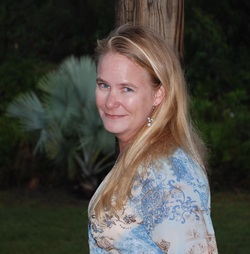
I love the internet. I love reading a snippet of a story on Facebook or Twitter, and becoming so intrigued that I drop down a rabbit hole of searches, chasing the elusive white rabbit into completely unexpected places. I often emerge feeling victorious from these treasure hunts, holding a bit of precious, obscure information. Often the hard-won knowledge is completely useless. Often I have spent far too long obtaining it, but there’s a feeling of smug satisfaction, as if I have accomplished something worthwhile just in the pursuit of it.
As I am on these fox-and-hound hunts, I am also answering email, Twittering, and responding to someone on Facebook. There is something that feels so very productive as I do these things. My mind feels like it is moving lightening quick as I jump from task to task, as if I am in a particularly challenging video game, or driving a race car on a crowded track. I go faster and faster until I am a blaze of energy as I juggle all these tasks at once. I am invincible.
The problem, of course, is that this mastery of multitasking is an illusion. We have become a nation of multitaskers, while studies show that the vast majority of us are very bad at it, no matter how good it feels. A recent study at Stanford shows that this type of juggling of electronic information is actually bad for us, that it can lower our IQ, as well as making it harder for us to organize our thoughts and sort out relevant information.
And sorting bad information from good has become a skill that has never been more important. Who ever thought, “I’m glad Google puts the most accurate and valuable information at the top of my searches”? Nobody, because what pops up first is the most popular, and despite what people may think, accuracy and popularity are not the same things. We are constantly bombarded with information, from the moment we wake up, until we fall asleep at night, our tablets clutched in our hands. But as we duck and weave through an ever-increasing artillery fire of the obscure and the irrelevant, we need to make sense of it more than ever, because humans are hard-wired to see cause and effect. Instead we are slowly drowning in information overload. Sure, we may know all about how twenty thousand birds disappeared overnight from a generations-long nesting ground, but how does this information help us make sense of the world?
Because this is why humans have been telling stories, from the time we were able to draw paintings on the walls of caves. Stories put order in a chaotic world. They put things in their proper perspective. When we are in a story, our brain lights up. The sections of our brain dedicated to touch and movement positively glow as we experience a story, as if we are actually living it. Studies show that humans derive more information from fiction than non-fiction, because in a real way our brain experiences a story as if we are experiencing it ourselves.
Stories help us cultivate “theory of mind,” which is our awareness of ourselves and others. This is an important skill that helps us in our navigation of complex human relationships, and enables us to function in society. It helps us connect with one another in a meaningful way, by understanding how others feel and respond. People who read stories are just plain more empathic than those who do not.
And reading stories is one of the most effective ways to overcome the stress of living in our increasingly bewildering world. A study from the University of Sussex shows that reading reduces stress by more than sixty-eight percent, more than enjoying a cup of coffee, or playing video games. Reading a thoroughly engrossing book eases the tension in the muscles and the heart.
Most of all, we need storytellers for the moral statements they make. Most of us simply don’t have the time to draw the big conclusions, to make sense of the chaos of knowledge that is thrown at us. We are on a breathtaking information roller coaster that is going too fast to do anything but hang on and scream. But while we may be enjoying the ride, we are losing the narration. We are missing out on seeing the complicated web of relationships that connect every event, every person, inside the bigger picture of our world.
The world still needs storytellers.
More than ever.
As I am on these fox-and-hound hunts, I am also answering email, Twittering, and responding to someone on Facebook. There is something that feels so very productive as I do these things. My mind feels like it is moving lightening quick as I jump from task to task, as if I am in a particularly challenging video game, or driving a race car on a crowded track. I go faster and faster until I am a blaze of energy as I juggle all these tasks at once. I am invincible.
The problem, of course, is that this mastery of multitasking is an illusion. We have become a nation of multitaskers, while studies show that the vast majority of us are very bad at it, no matter how good it feels. A recent study at Stanford shows that this type of juggling of electronic information is actually bad for us, that it can lower our IQ, as well as making it harder for us to organize our thoughts and sort out relevant information.
And sorting bad information from good has become a skill that has never been more important. Who ever thought, “I’m glad Google puts the most accurate and valuable information at the top of my searches”? Nobody, because what pops up first is the most popular, and despite what people may think, accuracy and popularity are not the same things. We are constantly bombarded with information, from the moment we wake up, until we fall asleep at night, our tablets clutched in our hands. But as we duck and weave through an ever-increasing artillery fire of the obscure and the irrelevant, we need to make sense of it more than ever, because humans are hard-wired to see cause and effect. Instead we are slowly drowning in information overload. Sure, we may know all about how twenty thousand birds disappeared overnight from a generations-long nesting ground, but how does this information help us make sense of the world?
Because this is why humans have been telling stories, from the time we were able to draw paintings on the walls of caves. Stories put order in a chaotic world. They put things in their proper perspective. When we are in a story, our brain lights up. The sections of our brain dedicated to touch and movement positively glow as we experience a story, as if we are actually living it. Studies show that humans derive more information from fiction than non-fiction, because in a real way our brain experiences a story as if we are experiencing it ourselves.
Stories help us cultivate “theory of mind,” which is our awareness of ourselves and others. This is an important skill that helps us in our navigation of complex human relationships, and enables us to function in society. It helps us connect with one another in a meaningful way, by understanding how others feel and respond. People who read stories are just plain more empathic than those who do not.
And reading stories is one of the most effective ways to overcome the stress of living in our increasingly bewildering world. A study from the University of Sussex shows that reading reduces stress by more than sixty-eight percent, more than enjoying a cup of coffee, or playing video games. Reading a thoroughly engrossing book eases the tension in the muscles and the heart.
Most of all, we need storytellers for the moral statements they make. Most of us simply don’t have the time to draw the big conclusions, to make sense of the chaos of knowledge that is thrown at us. We are on a breathtaking information roller coaster that is going too fast to do anything but hang on and scream. But while we may be enjoying the ride, we are losing the narration. We are missing out on seeing the complicated web of relationships that connect every event, every person, inside the bigger picture of our world.
The world still needs storytellers.
More than ever.

 RSS Feed
RSS Feed